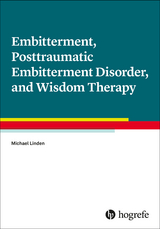Embitterment, Posttraumatic Embitterment Disorder, and Wisdom Therapy
Hogrefe Publishing (Verlag)
978-0-88937-612-0 (ISBN)
Practical expert guidance on embitterment disorders
Learn about the evidence-base of PTED and wisdom therapy
Teach clients skills to overcome embitterment
Tips on social, legal, and medical apsects
Includes printable handouts
A companion book for clients is available
Feelings of embitterment and posttraumatic embitterment disorder are common in our society and result from reactions to injustices, humiliation, and breaches of trust. They can lead to significant suffering in those affected and to those around them although the clients may be otherwise psychopathologically inconspicuous. The aggressiveness of this client group, as well as their rejection of help, among other factors, is challenging for practitioners and makes treatment complex. Help is at hand with this practical evidence-based guide that provides models for the development and continuation of such embitterment states as well as outlines how to diagnose embitterment disorder. The reader is guided through the state-of-the-art treatment approaches for embitterment disorder: cognitive behavior therapy with wisdom strategies.
Teach your clients how to process their internalized feelings of hurt and humiliation so that they can create the conditions to reconcile themselves with the events that triggered these difficult and long-lasting states. The book is full of practice-oriented tips to help clients actively gain closure with the past and enable a new orientation towards the future. One method to reach this goal is the reevaluation of the critical events and their consequences. Wisdom therapy provides various tools for this, and these techniques are brought to life with numerous case vignettes. The author also provides tips on the social, medical, and legal aspects associated with this disorder, for example, questions of work incapacity and criminal responsibility.
Helpful information for clients is provided in the accompanying book, How to Overcome Embitterment With Wisdom.
Prof. Michael Linden, PhD, is psychiatrist and licensed cognitive behavior therapist. He is director of the Research Group Psychosomatic Medicine at the Charite University Medicine Berlin and Medical Director of the Institute for Behavior Therapy Berlin. He has published books and several hundred articles in peer reviewed journals on psychological trauma, anxiety, depression and impairment because of mental disorders. He has done extensive research projects on embitterment and developed the basics of wisdom psychotherapy.
1 The Emotion Embitterment
1.1 Emotional Reaction to Humiliation, Vilification, and Injustice
1.2 Theory of Emotion
1.3 Function of Embitterment
1.4 Violation of Basic Beliefs
1.5 Psychology of Belief in a Just World
1.6 Injustice and Embitterment in a Societal Context
2 Resilience and Protective Factors Against Negative Life Events
2.1 Wisdom
2.2 Forgiveness
2.3 Intelligence and Problem-Solving Skills
2.4 Emotional Intelligence
2.5 Sense of Coherence
2.6 Morality
3 Posttraumatic Embitterment Disorder
3.1 Clinical Picture
3.2 Definition and Diagnostic Criteria of PTED
3.3 Differential Diagnosis of PTED
3.3.1 Differentiation of Intrusions, Rumination, and Associated
Symptoms
3.3.2 Differentiation Among PTED and Other Mental Disorders
3.3.3 Differentiation Among PTED and Other Forms of Bitterness
3.4 Embitterment and Aggression
3.5 Epidemiology and Course of Embitterment and PTED
3.5.1 Frequency
3.5.2 Course
4 Diagnosis of Embitterment Disorder
4.1 Self-Rating and Screening Instruments
4.2 Standardized Diagnostic Interview for PTED
5 Treatment of PTED
5.1 General Therapy Problems
5.2 Building a Therapeutic Relationship
5.3 Examination of the Critical Life Event
5.4 Examination of Intrusions, Emotions, Fantasies of Revenge, and
Changes in Everyday Life
5.5 Agreement on Treatment Goals and Motivation to Change
5.6 Wisdom Therapy
5.6.1 The General Structure of Wisdom Therapy
5.6.2 The Method of Insolvable Problems
5.6.3 Identification With a Fictional Victim
5.6.4 Perception and Acceptance of Emotions
5.6.5 Change of Perspective
5.6.6 Empathy and Compassion
5.6.7 Contextualism
5.6.8 Value Relativism
5.6.9 Self-Relativization
5.6.10 Self-Distancing
5.6.11 Emotional Serenity and Humor
5.6.12 Relativization of Aspirations
5.6.13 Long-Term Perspective
5.6.14 Uncertainty Tolerance
5.6.15 Knowledge of Facts and Procedures
5.6.16 Goal Clarification and Model Problem Solvers
5.6.17 Aphorisms Expressing Wisdom
5.7 Exposure
5.8 Salutotherapy and Promoting Activity and New Perspectives
5.9 Endangerment of Self and Others
5.10 Treatment Efficacy
6 Socio-Medical and Juridical Aspects
6.1 Incapacity to Work
6.2 Forensic Aspects
6.3 Criminal Liability
7 Conclusion and Outlook
8 References
9 Appendix: Tools and Resources
| Erscheinungsdatum | 08.06.2022 |
|---|---|
| Verlagsort | Toronto |
| Sprache | englisch |
| Maße | 153 x 229 mm |
| Themenwelt | Geisteswissenschaften ► Psychologie ► Klinische Psychologie |
| Geisteswissenschaften ► Psychologie ► Persönlichkeitsstörungen | |
| Medizin / Pharmazie ► Medizinische Fachgebiete ► Psychiatrie / Psychotherapie | |
| ISBN-10 | 0-88937-612-3 / 0889376123 |
| ISBN-13 | 978-0-88937-612-0 / 9780889376120 |
| Zustand | Neuware |
| Haben Sie eine Frage zum Produkt? |
aus dem Bereich




